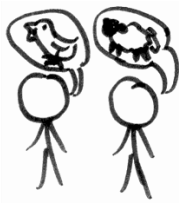This week's lesson is about Jeroboam and Rehoboam (remember those guys?). Rehoboam was one of King Solomon's sons. He wasn't as wise as Solomon, and only two of the twelve tribes accepted him as king. The others chose Jeroboam. And Jeroboam chose to trust his own wisdom to solidify his power. He was afraid that if his people continued to trek to Jerusalem to worship Jehovah, they would fall away from him. So he helped them fall away from Jehovah by setting up a couple of golden calves in Israel where they could go to worship. You can read all about it in I Kings 12.
Zoltan plans to play either a version of Simon Says (who are you going to listen to? whose directions are you going to follow?) or Davar Start Game A7, Who do you hear? (Two people make animal noises--a calf, for Jeroboam and a lion or lamb for Rehoboam).
This children's club is on one end of the Romany settlement. A family on the other end asked to have a children's club meet in their home, too, for the children around that area. Zoltan plans to meet that family this week, so see whether they still want to do this and to make other arrangements.
Prayer for the start of the regular club and the possible addition of a second one will be appreciated.
(Also, if your own club is willing to make a short video of this game, let us know. We're looking to add to the play list of Davar games.)
 A7: Who Do You Hear?
A7: Who Do You Hear?
Needed: Nothing extra.
Activity:
- Choose two people to make the sounds of two different animals. The sounds should differ only a little bit. For example, in American English, these might be a sheep, “baa”, and a chicken “baak, bak, baak”.
- These two people stand in front of the group with their backs to the group. Tell the group which animal sounds to expect. When person “A” makes his animal sound, those listening raise their right hand or do some other distinctive movement. When person “B” makes her animal sound, those listening raise their left hand or make some other sign.
- After a while let others take a turn at making other sounds. The fun is in making weird sounds. Make sure you laugh a lot together.
- Point out the differences in the sounds, too, or ask for someone to describe the differences in the two sounds.
- On the board or big sheet of paper you might write the letter that the different sound represents (the “k” sound in the English example).
- Repeat with different people in front making different sounds.
.jpg)
